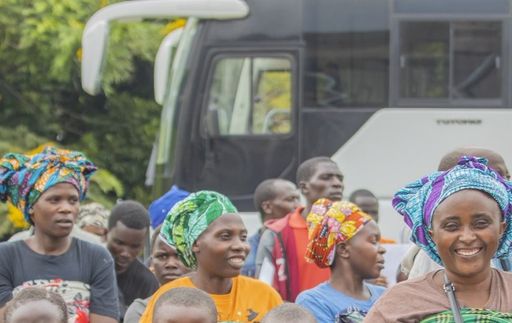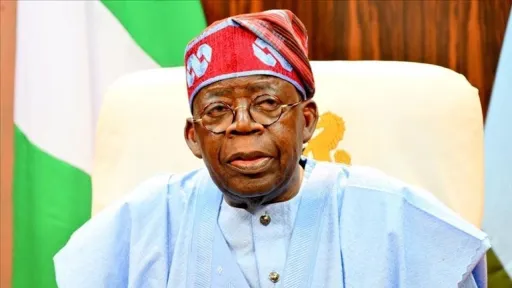The soil felt different under Marie-Claire Uwimana's feet as she set foot in her native Democratic Republic of the Congo (DRC) for the first time in eight years.
Rwanda, where she had lived all these years, offered her the security she couldn't have in the DRC – yet, like everyone torn between home and survival, she had left a piece of her heart behind while choosing the life of a refugee.
"You can't strike deep roots elsewhere when you have a homeland. Grateful as we were to our host nation for sheltering and keeping us safe, we would pine for home. We lived in suspended animation," the mother of two tells TRT Afrika.
Marie-Claire was among 533 refugees who voluntarily returned to conflict-ridden eastern DRC in a convoy from Rwanda recently, hoping to rebuild their lives.
Although the journey back home coincided with a resurgence of violence involving the M23 rebel group, humanitarian agencies see it as a small, yet significant confidence-building step born out of regional peace initiatives.
Fear of the M23 rebels, who have been waging war against the Congolese armed forces and pro-government militia, remains the main obstacle for millions of other displaced families wanting to return home.
Last weekend, the rebel outfit recaptured the town of Shoa in North Kivu province while the climate of instability persists in pockets like Sake, a town 60km from Goma that witnessed large-scale displacement.
Dignified return
UN High Commissioner for Refugees Filippo Grandi, who met some of the returnees during a week-long trip to DRC and Rwanda in August, speaks of "safe and dignified voluntary return" as the "most durable solution for many refugees".
He also seeks greater international support for the initiative, emphasising that the actual value of the recent peace agreements "will be measured by concrete actions that deliver lasting security, stability and investment in communities – so that return is not only possible, but sustainable".
For the returnees, sustainability means rebuilding from scratch while the spectre of M23 still looms overhead.
Jean-Pierre Basenge, who returned to his village near Goma last year, describes picking up the pieces as the most formidable challenge he has faced.
"You come back with your hands ready to work and your heart full of hope, but that is all," he tells TRT Afrika.
"The M23 took away our sense of security and our livelihoods. The fields are overgrown, and the house is damaged. You must start again like a newborn, albeit with the memory of all you have lost. We need real peace, not just pauses between fighting. We need tools, seeds and a chance to work without fear."

Handholding effort
Dr Anika Laurent, a psychologist working with returnees in Goma, focuses on helping people adjust to lives they once knew but that now feel unsettled in more ways than one.
"Their trauma is compounded," Dr Laurent explains. "They carry memories of the nightmare of being forced to flee, the stress of life in a camp, and now the anxiety of returning to a region where the threat of the M23 remains ever-present. Returnees often experience hypervigilance; every loud noise is a trigger. Healing requires not just therapy, but a genuine sense of security on the ground."
International support
During his visit, Grandi met the political leadership, including President Félix Tshisekedi, to discuss the challenges of resettlement.
In Sake, he interacted with people forced to flee repeatedly by M23's inroads into their neighbourhoods.
Grandi also praised Rwanda's "progressive approach towards including refugees in society", calling it a "powerful example" of understanding the pain of people displaced from their homes.
"We hope the recent peace efforts will create an environment where unhindered humanitarian access is guaranteed," says Grandi, acknowledging a big gap between what gets agreed in meetings and what happens on the ground.

To the people returning home, international support means real, everyday things.
Marie-Claire wants a plot of land away from the fighting so that she can resume farming without having to worry about her safety. For Jean-Pierre, it means having a job and making sure the armed rebels who terrorise his community are disarmed.
Both hope that when they hear planes overhead, they won't have to run back into the forests.
They have been brave enough to come back – that's the first step. Whether they can actually stay and rebuild depends on addressing the root causes of the problems stoking the conflict, including the M23 insurgency.
Marie-Claire knows the future is still uncertain, but her determination to stay put this time mirrors the feelings of a generation that wants to reclaim their home.
"We have been seeds scattered by the wind," she tells TRT Afrika. "Now we are back home, and we must be allowed to grow."
























